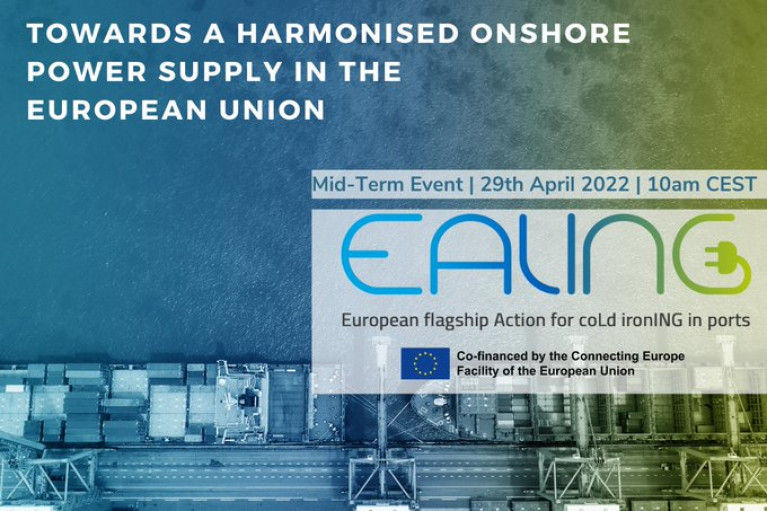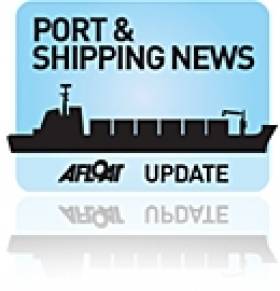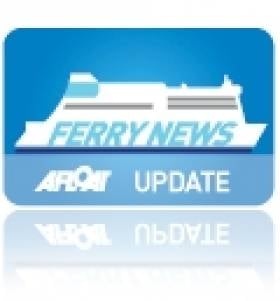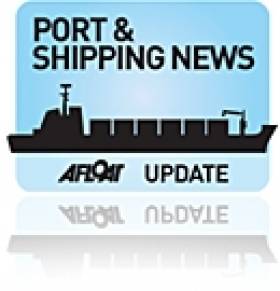Displaying items by tag: Motorways of the Sea
Irish Maritime Development Office in Partnership with European Flagship Action for Cold Ironing in Port
The Irish Maritime Development Office (IMDO) is a partner Motorways of the Sea project titled “European flagship Action for coLd ironING in ports “ (EALING).
The IMDO will be undertaking technical studies aimed at identifying the locations and requirements for OPS in Irish ports and developing high level designs & costs for the systems that could be deployed.
The EALING consortium has 22 partners from across Europe that represent the maritime community with Port Authorities, consulting companies in power system, energy and engineering, logistics, research and development bodies, IT suppliers.
The project aims to provide a common EU harmonised and interoperable framework for the transition to electrification and ultimately accelerate the effective deployment of OPS solutions in the EU maritime ports.
Further details are available on the project website here.
#MOSconference – A conference on the European Commission's Motorways of the Sea (MoS) initiative to streamline and promote intermodal maritime-based logistics chains is to be held in Liverpool.
The free-to-attend conference is being held at No. 1 Mann Island on 20-21 May, during the United Kingdom's Trade & Investment (UKTI) Export Week, also being held in the city.
Keynote addresses will include former Deputy Prime Minister and Ship's Steward, Lord Prescott. Technical sessions will showcase learning and solutions from 20 EU-funded projects, and highlight key issues to be addressed via future EU policy and funding.
The conference will be moderated by former North West MEP and European Parliament Transport Committee chair Brian Simpson, who is now the Motorways of the Sea project coordinator.
Liverpool City Region Local Enterprise Partnership executive director Mark Basnett said: "Do not be mistaken that this event is just a talking shop: it has real purpose, not least during UK Export Week. The chance to get the latest information and influence policy and funding decisions, combined with the opportunity for a face-to face session with key officials, makes this is a must-attend event for anyone interested in trying to secure funding from the Motorways of the Sea and wider Connecting Europe Facility programmes."
To attend the free event, delegates should register at http://attending.io/events/liverpoolmos2015
In advance of the event, on the afternoon of 19 May, 30-minute surgery sessions are available with EU Commission and UK Department of Transport officials in order to discuss potential projects. For further details contact [email protected] to arrange
Irish Sea 'Racehorse' Returns
Dawn Merchant and Brave Merchant represented the first pair of the 'Racehorse' class quartet of ro-pax sisters commissioned for the Cenargo Group. The quartet were built by Spainish shipbuilders Astilleros Espanoles SA in Seville, noting the first pair at 22,046grt where slightly smaller in tonnage terms compared to their 22,215grt counterparts Midnight Merchant and Northern Merchant. Upon delivery in 2000 the second pair were chartered to Norfolkline's Dover-Dunkerque route.
With a 130 truck capacity the Norman Trader can handle a marginally higher number of freight vehicles compared to the Norcape which handled 127 trucks. The Norcape, a 32-year-old freight-only vessel,was stood down in February and remains laid-up at Liverpool's Huskisson Dock. Incidentally, Norman Trader has joined one of her Racehorse class sisters, European Endeavour (formerly Midnight Merchant) which had directly replaced the Norcape on the central corridor route.
Likewise the European Endeavour is no stranger to the Irish route as for the last two years she has acted as winter relief vessel to cover the refits of the routes Dutch built ro-pax sisters Norbay and Norbank. The latter vessel is now undergoing a refit by Cammell Laird Shiprepairers in Birkenhead, now that the Norman Trader is in service to maintain the three-ship operated 8-hour route.
The Norman Trader had arrived into Dublin Bay last Friday from London's Tilbury Docks, on the next day she entered Dublin Port. In recent years she has operated on English Channel routes for the French shipping giant Louis-Dreyfus Armateurs through their ferry division LD Lines.
Norman Trader's (Dawn Merchant) sister Brave Merchant now renamed Norman Bridge also runs for LD Lines 'Motorways of the Seas' (MOS) route across the Bay of Biscay between Nantes /St. Nazaire to Gijón in northern Spain. The 14-hour route which started last year, which was run iniatially as a joint venture between Grimaldi Lines and Louis-Dreyfus and traded as GLD Atlantique.
- Dublin Port
- Bay of Biscay
- irish sea
- Ports and Shipping News
- Birkenhead
- Norcape
- RoPax
- DublinLiverpool
- Norfolkline
- FreightFerry
- Motorways of the Sea
- Norbank
- Norbay
- MOS
- European Endeavour
- Central Corridor
- P&O Irish Sea
- Norman Trader
- LD Lines
- Merchant Ferries
- Cenargo Group
- RaceHorse Class
- Tilbury Docks
- Cammell Laird
- Aintree
- Grand National
- Aintree Grand National
Car-Sales Boost Brings Busy Day to Dublin
Normally the Pauline operates on other routes. She along with her sister Yasmine are the largest vessels in the Compagnie Luxemburgeoise de navigation SA (CLnd) / Cobelfret fleet. The vessels are of the Con-Ro design, also known as the 'HumberMax' vessels which have 5,632 lane metres capable of carrying 258 container trailers and 656 cars.
Apart from the Dublin debut of the Pauline which docked at Ocean Pier, the final vessel of the trio, Celestine (1996 / 23,986grt) was the first to arrive from Zeebrugge, docking at the ferryport berth 51A (also used daily by Stena Line vessels). Like the Pauline, the Opaline (2009 / 25,235grt) docked at Ocean Pier and is the newest and last of six newbuilds built from German yard of FGS Flensburg.
CLnD won the Short-Sea Shipping Company Award in 2010 at the Irish Exporter Awards in November and hosted by the Irish Exporter Association (IEA). The award was sponsored by the Irish Maritime Development Office (IMDO) which recognises the strategically important role of short sea shipping to our island economy.
There are four sailings operated by CLnD between Dublin Port and Rotterdam / Zeebrugge. From the Dutch port there are onward sailings linking Göteborg and Esbjerg while the Belgian route connects the UK ports of Killingholme, Purfleet and Ipswich.
The development of the Irish routes are part of the "Motorways of the Sea", an EU-wide programme to promote a modal shift of goods from congested roads to alternative sea transportation. In addition to the concept is the international trend in the use of larger and more efficient vessels.
In October 2009 CLnD /Cobelfret switched their Irish operations from Rosslare to Dublin Port. The transfer to Dublin allowed CLnD to introduce larger tonnage at the then newly upggraded No. 2 ro-ro linkspan at Ocean Pier, Alexandra Basin East.
CLdN ro-ro SA and CLdN ro-ro UK offer ro-ro connections from Belgium and the Netherlands to the UK, Ireland, Sweden and Denmark. Both divisions share a combined core fleet of 20 vessels. Some ships including the Pauline are registered and flagged from land-locked Luxembourg. The fleet operate on short sea ro-ro trade routes, occasionally supplemented by time chartered tonnage, which accommodate trailers, containers, vehicles and other rolling equipment.

































































